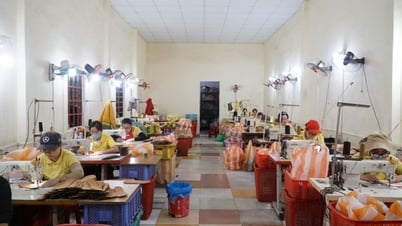The two banks that were forced to buy, OceanBank and CB, have been transferred. The remaining two weak banks that are being presented to the Government , Dong A Bank and GPBank, may have a plan before Lunar New Year 2025.
The proportion of capital invested in the economy is very high.
At a press conference to inform about the banking performance in 2024 and deploy tasks in 2025 on the afternoon of January 7, Deputy Governor of the State Bank of Vietnam (SBV) Dao Minh Tu shared information about the project to streamline the apparatus at SBV in the spirit of Resolution 18 of the Central Committee. Accordingly, a number of departments and bureaus will be reduced and merged to be more compact. 63 SBV branches in provinces and cities will be converted into regional SBV branches.
"This will require revising a series of related documents, especially the treasury issue at the end of the year, so the State Bank's work is very heavy," said Mr. Tu.
According to data from the State Bank of Vietnam, the banking industry's loan turnover for the whole year of 2024 will reach about 23 million billion VND, debt collection turnover will be about 21 million billion VND.
The additional supply to the economy compared to the outstanding debt of 2023 is about 2.1 million billion VND. The current outstanding debt is 15.6 million billion VND (at the end of 2023 it is 13.6 million billion VND). That shows that the proportion of credit capital put into the economy is very high.
The average deposit interest rate in 2024 increased by 0.73%/year compared to the end of 2023, the average lending interest rate decreased by 0.59%/year. Of which, the 4 Big4 banks reduced the average lending interest rate by nearly 1%/year compared to the end of 2023.
"At the end of 2024, some small commercial banks increased their deposit interest rates to ensure liquidity. The State Bank of Vietnam is still monitoring but there are no signs of having to stop it. Deposit interest rates are completely under control so that depositors do not have to run from one bank to another, and money does not flow from one sector to another," said Deputy Governor Dao Minh Tu.
In 2024, the State Bank will still ensure a reasonable monetary policy, ensuring the target of controlling inflation at 3.63% and GDP growth at 7.08%. These important indicators are contributed by credit investment and lower interest rates to create surplus value.

According to the Deputy Governor, the liquidity of commercial banks is very positive, there will be no shortage of capital in 2024. The credit room limit management mechanism has helped to meet businesses' capital requirements in a timely manner.
Mr. Tu also affirmed that the operating interest rate is stable and will not be adjusted in 2024, ensuring consistency and harmony with deposit and lending interest rates. However, the State Bank always directs commercial banks to reduce interest rates and save costs.
Exchange rate management, sometimes increased by more than 7%, but compared to Asia, Vietnam's exchange rate is still the most stable. On average, the exchange rate increased by about 5.03% throughout the year. The exchange rate sometimes goes up and sometimes down according to market supply and demand, ensuring harmony and balance between export and import. Enterprises and investors can be completely assured about Vietnam's exchange rate.
Over 50% reduction in fraud and money laundering after applying biometric authentication
Payment technology is a topical issue in 2024. Many commercial banks apply population data from the Ministry of Public Security , combined with bank programs in applying technology in non-cash payments, ensuring safety and security for the system.
To date, 84.7 million bank accounts have been biometrically authenticated. Fraud and account theft have decreased by over 50% since the introduction of biometric technology in payments.
Restructuring credit institutions (CIs), up to now all CIs are operating actively. Most banks have profits and higher profits than in 2023. Banks maintain reasonable interest rates to support businesses.
“Bad debt tends to increase. Even since there have been support policies such as extending and postponing debt repayments for businesses affected by Covid-19 from 2022 until now, many businesses have not been able to repay their debts,” said the Deputy Governor.
To date, most credit institutions have implemented the 2021-2025 restructuring plan and have met Basel III standards in governance objectives. Even medium-sized banks are very interested in this area.
Two banks that have been forced to buy have been transferred (OceanBank and CB). The remaining two weak banks are being presented to the Government (Dong A Bank, GPBank) and may have a plan before Lunar New Year 2025.
SCB Bank in particular is being maintained stably, ensuring people's deposits, along with handling violations and weaknesses caused by the bank and individuals, and is actively building a restructuring plan for SCB.
Source: https://vietnamnet.vn/hai-ngan-hang-yeu-kem-da-trinh-chinh-phu-co-phuong-an-truoc-tet-2360984.html




![[Photo] More than 17,000 candidates participate in the 2025 SPT Competency Assessment Test of Hanoi National University of Education](https://vphoto.vietnam.vn/thumb/1200x675/vietnam/resource/IMAGE/2025/5/17/e538d9a1636c407cbb211b314e6303fd)
![[Photo] Readers line up to visit the photo exhibition and receive a special publication commemorating the 135th birthday of President Ho Chi Minh at Nhan Dan Newspaper](https://vphoto.vietnam.vn/thumb/1200x675/vietnam/resource/IMAGE/2025/5/17/85b3197fc6bd43e6a9ee4db15101005b)

![[Photo] Prime Minister Pham Minh Chinh chairs meeting on science and technology development](https://vphoto.vietnam.vn/thumb/1200x675/vietnam/resource/IMAGE/2025/5/17/ae80dd74c384439789b12013c738a045)
























![[Photo] Nearly 3,000 students moved by stories about soldiers](https://vphoto.vietnam.vn/thumb/1200x675/vietnam/resource/IMAGE/2025/5/17/21da57c8241e42438b423eaa37215e0e)





































































Comment (0)